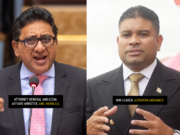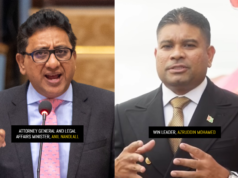Guyanese businessman Azruddin Mohamed is of the firm conviction that the shortage of US currency in Guyana, leading to the exchange rate soaring to an all-time high of GY$228 to US$1 is a net effect of the US-imposed sanctions on his family’s cambio operations.
Last year, the United States Office of Foreign Assets Control (OFAC) sanctioned Azruddin, his father Nazar Mohamed, and their businesses. Following the sanctions, their cambio licence was later revoked by the Government of Guyana.
In a statement on Tuesday, Mohamed said, “Major shortage of USD, stands at all time high 228-1. Over 100 million USD in transfers pending through the banks.”
According to Mohamed, the shortage has rocked commercial banks, with over 1,000 wire transfers pending across three major commercial banks. He claimed that “The small amount of US currency released to commercial banks by the Central Bank cannot offset the growing demands.”
Mohamed said that businesses have reported serious setbacks, especially in clearing goods at the wharf. He explained that many are required to pay 70% of shipping costs on arrival, but delays in accessing US dollars have led to mounting storage fees as high as US$100 per container per day.
The sanctioned businessman also stated that some business owners have also voiced frustration about wire transfer delays. Mohamed added, “Businessmen continue to complain bitterly about waiting months before banks can do a wire transfer of a mere US$50,000.”
Further, he stated that the US currency shortage is not only affecting the business community but also ordinary citizens.
“This is undoubtedly a spin off from the absence of the Mohameds as a major player in the market. Prior to the sanctions, all transactions from exports done by the Mohameds were paid through the banks which in turn, brought in foreign currency into the banking system,” Mohamed said.
Further, he also alleged that US currency entering from Guyana’s borders is immediately bought out by some players, leaving small traders scrambling. He stated that according to sources from the Private Sector Commission and regional Chambers of Commerce, political operatives are buying up foreign currency from local money changers, further exacerbating the crisis.
To this end, he noted that some stakeholders are afraid to speak out for fear of victimization. He urged the Central Bank and to an extent, the Government of Guyana to “address the issue spot-on and stop pussyfooting since the small business people are the ones who are suffering the most.”













